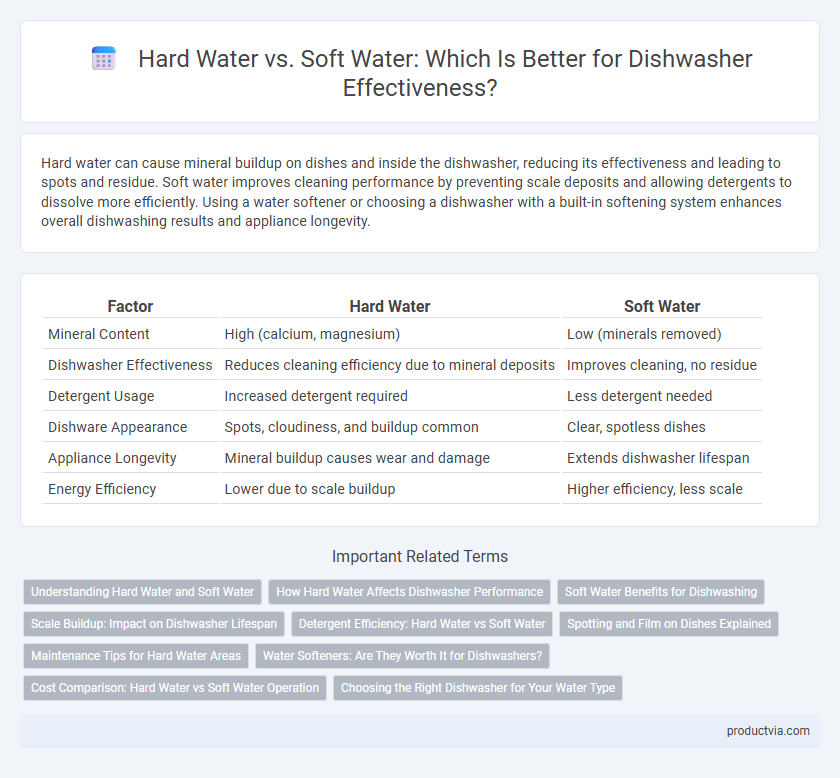Hard water can cause mineral buildup on dishes and inside the dishwasher, reducing its effectiveness and leading to spots and residue. Soft water improves cleaning performance by preventing scale deposits and allowing detergents to dissolve more efficiently. Using a water softener or choosing a dishwasher with a built-in softening system enhances overall dishwashing results and appliance longevity.
Table of Comparison
| Factor | Hard Water | Soft Water |
|---|---|---|
| Mineral Content | High (calcium, magnesium) | Low (minerals removed) |
| Dishwasher Effectiveness | Reduces cleaning efficiency due to mineral deposits | Improves cleaning, no residue |
| Detergent Usage | Increased detergent required | Less detergent needed |
| Dishware Appearance | Spots, cloudiness, and buildup common | Clear, spotless dishes |
| Appliance Longevity | Mineral buildup causes wear and damage | Extends dishwasher lifespan |
| Energy Efficiency | Lower due to scale buildup | Higher efficiency, less scale |
Understanding Hard Water and Soft Water
Hard water contains high levels of calcium and magnesium ions, which can lead to mineral buildup and reduce dishwasher effectiveness by causing spots and residue on dishes. Soft water, treated to remove these minerals, improves detergent performance and results in cleaner, spot-free dishes with less appliance wear. Understanding the differences between hard and soft water is crucial for selecting appropriate dishwasher detergents and water softening systems.
How Hard Water Affects Dishwasher Performance
Hard water contains high levels of calcium and magnesium, which cause mineral buildup inside the dishwasher, reducing its efficiency and lifespan. This buildup results in clogged spray arms, less effective detergent performance, and spots or film on dishes after washing. Using a water softener or dishwasher with built-in water softening features enhances cleaning results and protects appliances from damage caused by hard water deposits.
Soft Water Benefits for Dishwashing
Soft water enhances dishwasher effectiveness by preventing mineral buildup on dishes and inside the machine, ensuring cleaner and spot-free results. It reduces detergent usage due to its superior ability to dissolve soaps, leading to cost savings and less chemical residue. Soft water also extends the lifespan of the dishwasher by minimizing limescale deposits on heating elements and internal components.
Scale Buildup: Impact on Dishwasher Lifespan
Hard water contains high levels of minerals like calcium and magnesium, which lead to scale buildup inside dishwashers, reducing their efficiency and shortening their lifespan. Soft water, with fewer minerals, prevents scale formation, ensuring optimal performance and extending the durability of dishwasher components. Regular use of water softeners or conditioners can protect dishwashers from mineral deposits and costly repairs.
Detergent Efficiency: Hard Water vs Soft Water
Hard water contains high levels of calcium and magnesium ions that reduce detergent efficiency by forming insoluble salts, leading to residue buildup and less effective cleaning in dishwashers. Soft water enhances detergent performance by allowing the surfactants to effectively break down grease and stains without interference from mineral deposits. Using soft water can improve cleaning results, reduce detergent usage, and prolong dishwasher lifespan by preventing scale accumulation.
Spotting and Film on Dishes Explained
Hard water contains high levels of calcium and magnesium, which often cause spotting and a cloudy film on dishes after washing. Soft water, treated to remove these minerals, prevents mineral buildup, resulting in cleaner, spot-free dishes. Using a dishwasher detergent formulated for hard water can further reduce spotting and improve overall cleaning effectiveness.
Maintenance Tips for Hard Water Areas
Hard water containing high mineral levels causes limescale buildup inside dishwashers, reducing effectiveness and lifespan. Using a water softener or adding dishwasher-safe descaling agents regularly prevents mineral deposits and enhances cleaning performance. Regularly cleaning filters and spray arms ensures optimal water flow and prevents blockage caused by hard water residues.
Water Softeners: Are They Worth It for Dishwashers?
Water softeners improve dishwasher effectiveness by reducing mineral buildup caused by hard water, which can leave spots and residue on dishes. Hard water contains high levels of calcium and magnesium, leading to clogged spray arms and detergent inefficiency, while softened water promotes better cleaning and extends appliance lifespan. Investing in a water softener enhances dishwasher performance, reduces maintenance costs, and ensures sparkling, spotless dishes.
Cost Comparison: Hard Water vs Soft Water Operation
Operating a dishwasher with hard water increases maintenance costs due to mineral buildup that necessitates frequent descaling and part replacements. Soft water reduces energy consumption and detergent use while prolonging appliance lifespan, resulting in lower overall operating expenses. Investing in a water softening system yields significant long-term savings by minimizing repair costs and improving dishwasher efficiency.
Choosing the Right Dishwasher for Your Water Type
Selecting a dishwasher compatible with your water type enhances cleaning performance and extends appliance lifespan. Hard water dishwasher models feature specialized filters and built-in water softeners to prevent mineral buildup and reduce spots on dishes, while soft water-compatible dishwashers optimize detergent use and protect against corrosion. Understanding local water hardness levels and matching them with appropriate dishwasher technologies ensures optimal cleaning efficiency and maintenance costs.
Hard water vs soft water for dishwasher effectiveness Infographic

 productvia.com
productvia.com